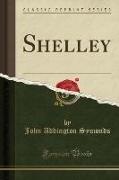Read more
Excerpt from Shelley
August 4, 1792, is one of the most memorable dates in'the history of English literature. On this day Percy Bysshe Shelley was born at Field Place, near Horsham, in the county of Sussex. His father, named Timothy, was the eldest son of Bysshe Shelley, Esquire, of Goring Castle, in the same county. The Shelley family could boast of great antiquity and considerable wealth. Without reck~ oning earlier and semi-legendary honours, it may here be recorded that it is distinguished in the elder branch by one baronetcy dating from 1611, and by a second in the younger dating from 1806. In the latter year the poet's grandfather received this honour through the in¿uence of his friend the Duke of Norfolk. Mr. Timothy Shelley was born in the year 1753, and in 1791 he married Elizabeth, daughter of Charles Pilfold, Esquire, a lady of great beauty, and endowed with fair intellectual ability, though not of a literary temperament. The first child of this marriage was the poet, named Bysshe in compliment to his grandfather, the then living head of the family, and Percy because of some remote connexion with the ducal house of North timberland. Four daughters, Elizabeth, Mary, Hellen, and Margaret, and one son, John, who died in the year 1866, were the subsequent issue of Mr. Timothy Shelley's mar riage. In the year 1815, upon the death of his father, he succeeded to the baronetcy, which passed, after his own death, to his grandson, the present Sir Percy Florence Shel ley, as the poet's only surviving son.
About the Publisher
Forgotten Books publishes hundreds of thousands of rare and classic books. Find more at www.forgottenbooks.com
This book is a reproduction of an important historical work. Forgotten Books uses state-of-the-art technology to digitally reconstruct the work, preserving the original format whilst repairing imperfections present in the aged copy. In rare cases, an imperfection in the original, such as a blemish or missing page, may be replicated in our edition. We do, however, repair the vast majority of imperfections successfully; any imperfections that remain are intentionally left to preserve the state of such historical works.

